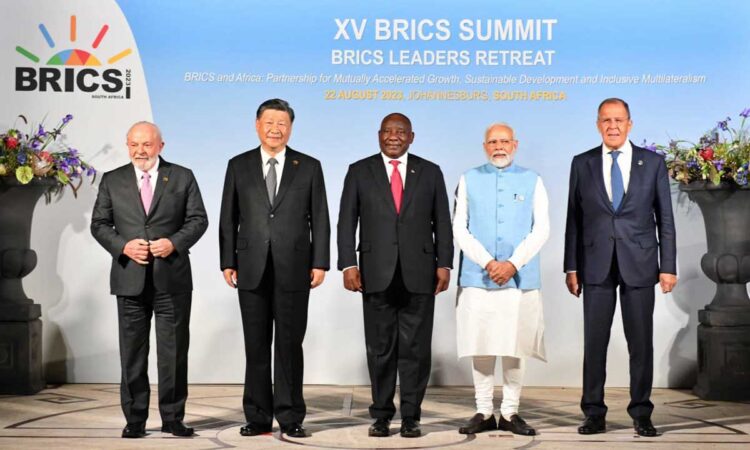
In an age characterized by the economic and political rise of developing economies in the Global South, the BRICS coalition has formidably challenged the Western World Order led by the United States. The whispers and stories of the Southern World order with China being a rising challenger can be heard across the parliamentary halls, media, and think tanks. The widespread economic and political consequences of sanctions imposed by the US, and its failure to fulfill its commitments of proportional and timely climate financing along with health and food security are sources of disillusionment among developing states that are now jumping on the bandwagon of BRICS. Despite of exclusion of its six expanded members, this economic clout had already surpassed G7 in the global GDP ratio as it accounted for 32% against 30% of G7. This GDP ratio is expected to rise to 50% in 2030.
BRICS nations call for an equitable world order by reforming established international institutions like the United Nations, IMF, and World Bank led by the West. The UNGA on Dec 14, 2022, adopted a resolution named ‘Towards a New International Economic Order’ which got 123 votes in its favor. This was a major blow to the politics of the Western bloc as the assembly expressed grave concerns over the rising debt vulnerabilities of developing countries, stringent policies, and conditions set by Western global financial institutions. As a result, it demanded the exploration of new means and instruments that could help to reduce the debt burdens of developing states. Secretary General United Nations, Antonio Guterres in his speech at a recent BRICS summit, advocated for reforms in International institutions to adapt to the changing economic and technological landscape. In verity, he validated the demands of BRICS nations by highlighting the economic and environmental discrimination faced by the African region.
These discontented states of BRICS have made significant progress in achieving the goal of restructuring global institutions while challenging Western dominance. The formation of the National Development Bank emulating the model of the World Bank is a notable development in the BRICS journey toward institutional reforms. NDB provides financing for infrastructure and development projects across the developing nations. The funding body also seeks to address the borrowing needs of low-income states by granting loans with no particular concerns of exchange rates and conditions like IMF. Since its inception, it has approved $32 billion for projects of sustainable development and infrastructure across the globe. The bloc members have agreed to create a $100 billion Contingency Reserve Arrangement, a foreign currency that they can lend to any member plagued by a financial crisis. Additionally, its $10 billion Emergency Support Fund has significantly supported developing states like South Africa to fight the COVID-19 pandemic.
The process of de-dollarization has undeniably commenced posing a serious threat to the dominance of the US dollar. Leaders of BRICS have issued statements to develop a bloc or reserve currency replacing the US dollar as the main currency for international trade. BRICS nations have already started utilizing their local currencies for their trade and financial payments. In early 2023, even the oil giants like Saudi Arabia, where the dollar ascended its throne also opened itself for non-dollar trade agreements. Argentina and Bolivia have initiated settling IMF payments, imports, and exports in yuan as a substitute for already dwindling dollar reserves. The emergence of Chinese currency in the South American market strengthens their reserve currency narrative while slowly eroding the dollar’s supremacy. In July 2023, India and UAE also signed an agreement to settle oil trade in rupees instead of dollars. Moreover, there is a shred of convincing data evidence that raises the likelihood of BRICS nations adopting the Gold Standard Era of the 18th and 19th centuries. According to the IMF World Gold Council, China, Singapore, Russia, and Turkey remained the largest purchasers of gold in the opening months of 2023. Conjointly, according to IMF, the Central Banks have witnessed a notable decrease in shares of US dollar reserves. Last but not least, NDB has also issued bonds in African markets denominated by rand, attracting the highest ever 2.67 billion rands of bid. The development body seems not to confine itself to the rand but has also announced to launch Indian rupee bond this month.
The winds of reform are undeniably blowing with the growing influence of BRICS as it seeks a just and equitable world order. However, it is important to regard that the road to establishing an overarching Southern World Order is replete with complex challenges and unresolved questions. At first, de-dollarization is not an overnight process. The use of the US dollar remains prevalent in many financial transactions such as NDB itself having the highest shares of bonds in the US dollar. China’s rising influence in the MENA region (Saudi-Iran rapprochement) has lured Middle Eastern countries to join BRICS to boost their economies. However, the expected normalization of Saudi Arabia and Israel under the shadow of the Abraham Accords negotiated by the US creates a fog of uncertainty in their future foreign policy stance. Whether Saudi Arabia and UAE would seek an erosion of the US-led Western world order or remain satisfied with the status quo is a major question. Political tensions between India and China are the source of prevailing mistrust as India has also shown reluctance to embrace the expansion of BRICS as it sees the bloc as a mouthpiece for China in the long run. Lastly, India’s pivotal role in the India-Middle East- Europe Corridor can jeopardize the future of BRICS as it aims to counterbalance China’s rise through BRI and BRICS.






